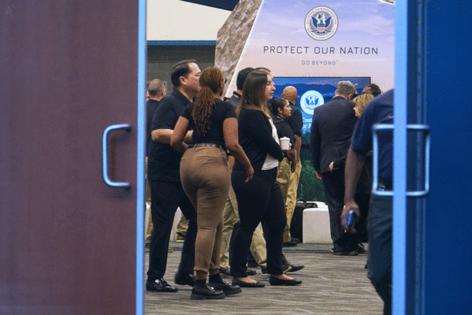Commentary: Do we really want armed 18-year-olds on ICE raids?
Published in Op Eds
Immigration and Customs Enforcement held a hiring fair last month in Provo, Utah, that drew hundreds of job seekers — in part with signing bonuses up to $50,000 and salaries of $50,000 to $100,000 a year. This follows recruiting events in Arlington, Texas, in August and Chantilly, Virginia, in June. Despite polls showing that most Americans do not like how the agency is doing its job, these expos were quite popular. “This is a highly desired career,” an ICE official told reporters at the Texas event. “A lot of people want to do this job.”
That seems to be true, which makes recent changes in ICE’s hiring and recruiting practices all the more troubling. Flush with cash from Congress, the agency is ramping up hiring while lowering standards for employment. ICE is using controversial slogans and imagery to attract new recruits. In its rush to expand, ICE is placing immigrants, citizens and its own agents in harm’s way.
Under the terms of the One Big Beautiful Bill Act that the president signed into law in July, Congress has given ICE an additional $75 billion in funding. The agency wants to hire at least 10,000 new agents as the administration seeks to fulfill its promise of deporting a million immigrants a year.
To meet this goal, ICE is lowering hiring standards. ICE agents can now be as young as 18, and there is no longer an age cap for new hires. The agency has also cut training time for recruits from 13 to eight weeks, by reducing Spanish lessons, firearms training and classroom hours. Working for ICE does not require a high school diploma, a military background or any law enforcement experience. An aspiring ICE agent only has to pass a background check, meet physical and medical requirements, and complete the abbreviated training course.
In contrast, many local police and sheriff’s departments have stricter hiring requirements. The Los Angeles Police Department requires its applicants to have a high school diploma, to complete six months of training and to be 21 at the time of police academy graduation.
ICE’s lower standards are alarming, given that agents have the power to make decisions with life-altering consequences. A teenager who formerly worked in a retail store or office workers bored with their daily routine could soon be out on the streets of L.A., carrying a gun and chasing anyone they think might be a migrant. New ICE agents might be placed in volatile situations without enough experience or judgment to make sound decisions. Immigrants — or anyone who looks like one— may be at risk of rookie ICE hires violating their constitutional and civil rights.
Unfortunately, we have been here before. Between 2006 and 2009, the Border Patrol scaled up quickly too. Hiring and training requirements were eased, with some agents rushed into training before background checks were completed. This resulted in drug cartel members being hired, corruption and a spike in agents being arrested for misconduct. With its ongoing rapid expansion, ICE is poised to repeat the same kind of mistakes.
ICE’s recruitment campaign is likewise problematic. “America has been invaded by criminals and predators. We need YOU to get them out,” is one such appeal, which plays on false notions of “invasion” and immigrant criminality. On its official X account, Homeland Security uses images of Uncle Sam, as though joining ICE were akin to a military mobilization. In one post, the agency asks, “Want to deport illegals with your absolute boys?” In another, it asks, “Which way, American man?” This meme appears to reference, “Which Way Western Man?” — a 1978 book by an avowed white supremacist.
ICE slogans urge job seekers to “Defend Your Country” and “Protect the Homeland.” But such language smacks of propaganda, not professionalism. Former ICE officials are rightfully concerned that such tactics might draw the wrong kind of recruits. Rather than attracting qualified applicants who want to serve in federal law enforcement, ICE may be appealing to people with antipathy toward immigrants, or who see themselves as helping defend the U.S. from demographic changes.
ICE performs a vital function for the government, with agents shouldering great personal risk and responsibility. Yet ICE’s current practices are far from ideal, with well-documented instances of agents using excessive force and engaging in physical and verbal abuse of suspected undocumented immigrants. So this is not the time for ICE to lower standards. The agency’s latest hiring and recruiting efforts will not bolster the agency’s image or effectiveness. Instead they raise serious questions about new agents’ readiness, ability and suitability for this line of work. To put it simply, do we really want teenagers participating in ICE raids?
To remedy the situation, ICE should slow down and properly train incoming agents. The minimum age should be reinstated to 21. More thorough Spanish-language instruction should be restored to curriculums. Otherwise, fast-tracked employees will be sent unprepared into communities that are already angry and fearful, which is potentially dangerous for everyone involved.
ICE’s hiring spree is reckless and irresponsible. As a matter of public safety, immigration enforcement should not be an entry-level job.
____
Raul A. Reyes is an immigration attorney and contributor to NBC Latino and CNN Opinion. X:@RaulAReyes; Instagram:@raulareyes1
©2025 Los Angeles Times. Visit at latimes.com. Distributed by Tribune Content Agency, LLC.
























































Comments